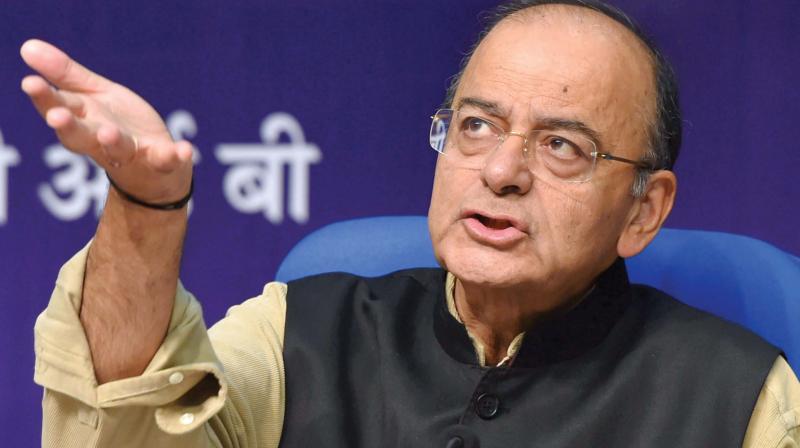India growing at 'new normal' growth rate of 7-8 per cent: Jaitley
On the deteriorating bad loans position of banks, Jaitley said it was mainly on account of the loans given to industry prior to 2014.

New Delhi: Finance Minister Arun Jaitley on Thursday exuded confidence that the upward movement of the global economy will also help India which has been growing at the "new normal" growth rate of 7-8 per cent.
Replying to a debate on the second batch of supplementary demands of grants in the Lok Sabha, he said the decision to bring petroleum products under the Goods and Services Tax (GST) will be taken by the GST Council.
The lower house later approved the supplementary demands envisaging a total additional expenditure of about Rs. 66,113 crore, of which net outgo would be Rs. 33,379 crore.
The minister also took a dig at the Congress, saying that there was no talk of 'Gabbar Singh Tax' when the overall indirect tax rate was 31 to 31.5 per cent on average before introduction of the GST.
"When you imposed 31.5 per cent tax (including excise, VAT, CST and cascading effect), nobody remembered the Gabbar Singh Tax. Now tax rate is only 18 per cent," Jaitley said.
During the election campaign in Gujarat, Congress leader Rahul Gandhi had dubbed the GST as 'Gabbar Singh Tax'.
On the issue of inclusion of petroleum goods in the GST regime, Jaitley dared the Congress party to ask their chief ministers in five states to openly say that they favour GST on petroleum goods.
He further said that petroleum goods are zero rated under the GST and a decision would be taken by the GST Council on whether to bring them under the new tax regime.
The government, he said, could not have postponed GST rollout as it was constitutionally binding to have the new tax regime by September 16, 2017.
He also assured the House that no state will lose revenue on account of implementation of GST as there is a guarantee by the Centre to compensate them for 5 years.
Referring to the global economy, the finance minister said there was a "visible reversal" and upwards movement will help India which has grown by 7-8 per cent, a new normal, in the past three-and -half years.
The global economy is expected to grow by 3.6 per cent in 2017 and 3.7 per cent next year.
Jaitley further said during the last three-and-half years, the government has been able to bring down the fiscal deficit, current account deficit, contain inflation and stabilise exchange rate.
He said the government has enacted a law mandating Monetary Policy Committee to maintain inflation at 4 per cent plus/minus 2 per cent.
Inflation has already come down from double digits during the UPA regime to 2-2.5 per cent and is very much within the 4 per cent limit, he said.
The rise in inflation last month can be attributed to three factors -- vegetable price rise after rain, surge in crude oil prices and disbursement of allowances to central government employees, he added.
Observing that India no more suffers from policy paralysis and fear of being part of the 'fragile five' global economies, Jaitley said "India is a bright spot, sweet spot, fastest growing major economy in the world".
He further said the structural reforms -- GST and demonetisation -- have temporarily slowed down the economy but they will accelerate growth in the coming years as happened after the launch of liberalisation in 1991.
On the deteriorating bad loans position of banks, Jaitley said it was mainly on account of the loans given to industry prior to 2014.
The government has taken various initiatives, including the bankruptcy code that will make industrialists stand in queue for bankruptcy, he said, adding banks are being recapitalised to the tune of Rs. 2.11 lakh crore.
On the disinvestment of Air India, he said it was unfair to ask taxpayers to bear the burden of Rs. 55,000 crore debt for running of the national carrier.
"There is a right time to privatise otherwise nothing will be left to privatise," he said.

